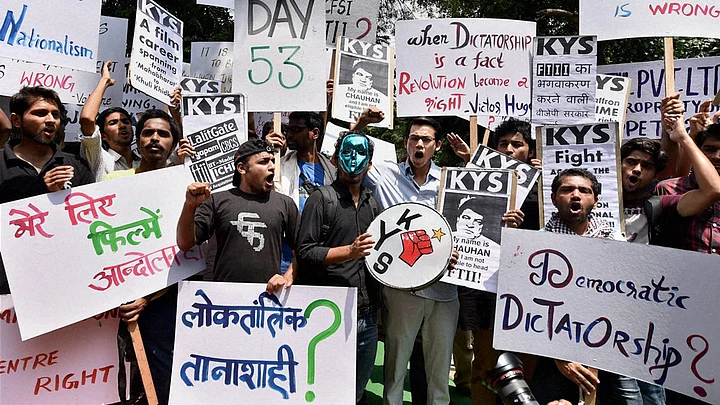Protests rage on at The Pune Film Institute over the appointment of TV actor Gajendra Chauhan as its chief karta dharta.
You know that already.
Meanwhile, the entire official policy is in a holy mess to put it politely. The National Film Development Corporation, the Films Division, the Children’s Film Society of India, the National Film Archive in Pune, the Directorate of Film Festivals under the Ministry of Information and Broadcasting, all appear to be in a state of severe limbo.
A terminal ailment in these hallowed institutions has been setting in since over a decade if not decades now. And it isn’t just a question of today’s ruling party being a-dither about how to stem the rot.
Every party – quasi-socialist or right-wing – has been unable to define the nation’s film culture policy. Indeed, the incorrigible rite has been to stuff the institutions with party loyalists. How else can any sane mind explain the selection of Chauhan for the Film Institute, or of Mukesh ‘Shaktimaan’ Khanna as the major domo of the Childrens’ Film Society?
Need for Overhaul
Every governmental film body is crying out loud for a rehaul. In fact, that was the categorical conclusion reached by an expert evaluation committee set up over two years ago (to substantiate this report, I have a copy of their rather damning conclusions).
On the condition of anonymity, one of the experts stated that the conclusions were “discarded in a waste paper basket.” To that he adds, “When we appealed to the present government’s representatives to consider our recommendations, they did agree. But again, our evaluation reached a waste paper basket. No one wants to tweak the status quo.”
That metaphorical waste-paper basket must have shot up to the height of the Qutab Minar, topped by the committee’s poison darts aimed at the Films Division, which incidentally occupies a sprawling stretch of prime estate on Mumbai’s swishy Peddar Road. Over the years, I’ve been tracking the highs and lows (more lows, actually) on the Films Division tree-lined campus.
The Rot
- Believe it or faint, one of its chiefs, a believer in tantric rituals, had sparked a right royal scandal. The guesthouse rooms, it was alleged, were used for ‘shady activities’ (hmmmm) and nude photos had been discovered there of a wannabe dusky actress who went on to be a successful screen cougar. The chief producer was transferred but returned to the chair, once the sizzle fizzled.
- A much-publicised Film Museum was to open on the campus last year. If it has, it’s probably the nation’s best kept secret.
- Documentaries commissioned by the Films Division dare not stray from the beaten path. If they do, trouble bubbles. Classic proof tongues were wagged when iconic artist M F Husain delivered his impressions on Rajasthan. What’s that, asked the Division higher-ups but at humble pizza when Through the Eyes of a Painter (1967) won the Golden Bear at the Berlin film festival.
The last chief aka director general V S Kundu, sad sighs go, attempted to do whatever he could. Whatever that means. His desk was adorned by a wooden board, pleading, “Do not offer bribes”. An LOL effect that! Kundu saab has now left his post, and if the grousevine is to be believed, will soon direct his own feature film. Good luck.
Films Division Kaput
To return to those imperative and reformist conclusions reached by the evaluation committee, just check out some of the excerpts paraphrased for brevity. In essence, these underscore the point that the Films Division has outlived its purpose.
- Once upon a time, a cess of 1% was charged from cinema halls for the compulsory screening at every show of a documentary, news magazine or ‘quickie’. Cinema hall owners went to court. In any case, the enforcement became irrelevant with the advent of satellite TV channels, internet and digital platforms.
- The Films Division, whose output doesn’t receive subsidies and tax incentives, is essential, but has to be redefined and restructured, pronto.
- Its goldmine of documentaries and news chronicles have to be preserved, which they are electronically, but must of flawless quality.
- The Films Division is overstaffed.
- Independent filmmakers into documentaries and short films are stealing the thunder, at home and abroad.
- Of its harvest, an earlier committee’s critical assessment has to be noted seriously: only 35% of its documentaries and news features can be termed excellent, 35% sub-standard, and the rest, average.
- Propaganda for the presiding government should not be its credo.
- The general stock of films has been jaded and the biographies attempted most often were hagiographies.
- Collaborations should be sought with Doordarshan and satellite channels, besides tie-ups with the Tribeca and Sundance festivals and the Doha Film Institute.
- And how about deriving some inspiration from the Discovery Channel? Or the structure of the National Film Board of Canada?
- Films Division should be renamed as the Films Division of India or the Indian Documentary Association. Its festival, Mumbai International Film Festival, should be renamed in order to indicate that it is devoted to documentaries.
- Films Division lacks the core competence to carry off film festivals.
Ouch. And these are just a few of the conclusions. To read the committee’s thoughtful and let’s-live-with-the times evaluation, that Qutab Minar-sized waste-paper basket needs to be found, and fast.
(The writer is a film critic, filmmaker, theatre director and a weekend painter)
